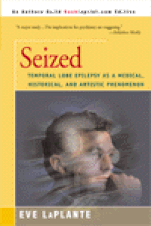
TO KOREAN READERS
I am pleased to share with you my book about temporal lobe epilepsy, a common neurological disorder that affects an estimated 200,000 Koreans. Despite being the most common form of epilepsy among adults, TLE has a history of being kept secret.
Seized, the first book for a general audience ever written about TLE, came out in the United States in 1993 and received excellent reviews. Yet it was met with silence by the Epilepsy Foundation of America. It turned out that the EFA, in its mission to maintain a positive image and remove the stigma from epilepsy, avoided discussing anything considered controversial. The advocacy group actively suppressed information about TLE because of the disorder’s links with mental illness and personality change. In the words of Jeffrey Cummings, professor of neurology and psychiatry at UCLA, epilepsy associations “oppose the general idea of relating psychopathology and epilepsy,” a relationship that “has been repeatedly demonstrated.”
The price of this secrecy is high. Preventing the flow of information about TLE curtails public awareness and hinders patient care. People with TLE are denied basic information about their disorder. Many people with the disorder wait years, even decades, for a correct diagnosis. In the meantime, they may be prescribed psychiatric medications, even institutionalized. Doctors suspect that some so-called “chronic schizophrenics” languishing in mental hospitals may in fact have this treatable form of epilepsy.
TLE should not be hidden. The public deserves to know about it, people with TLE agree, as attested to in hundreds of letters I’ve received from readers of Seized. I hope the arrival of Seized in Korea increases public awareness of this fascinating and revelatory disorder, and provides helpful information to TLE patients and their families and friends.

 RSS Feed
RSS Feed